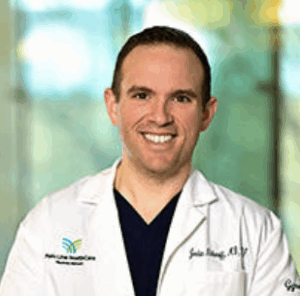Dr. Jordan Klebanoff, M.D.
Endometriosis Specialist, Gynecologist, Minimally Invasive Gynecologic Surgeon
Summary: If you’re seeking expert care for endometriosis, Dr Jordan Klebanoff is a trusted specialist dedicated to helping women improve their quality of life. As both a gynecologist and minimally invasive surgeon, Dr Klebanoff brings deep expertise and compassionate care to each patient he treats in Philadelphia, PA.
Dr Klebanoff understands that endometriosis is a complex condition with many possible causes, including embryologic, genetic, and environmental factors. He specializes in wide excision surgery, which aims to remove even microscopic disease and offer lasting relief.
For patients who aren’t considering surgery, Dr Jordan Klebanoff offers personalized medical management, including non-narcotic pain relief and hormonal therapies. He also works closely with pelvic floor physical therapists, pain specialists, and gastroenterologists to provide a comprehensive, patient-centered approach to care before and after surgery.
City: Philadelphia, PA, USA
Philosophy: I believe that we have an incomplete understanding of the origins of endometriosis, however, that the theory of retrograde menstruation as the sole explanation falls well short of describing this complex disease. My belief is that there are likely many factors to explain this disease embryologic, genetic, environmental, etc. The theory that I believe most completely and rationally explains this disease process is an issue during embryologic development. This is why I believe excision surgery most thoroughly improves quality of life. Wide excision surgery will remove microscopic disease whereas localized excisions or ablation can fall short.
Medication: For patients not immediately, or ever, interested in surgery I will utilize non-narcotic pain medications and hormonal regulation where appropriate. Whether or not I recommend hormonal suppression, most often with an oral progestin, following excision surgery is based on individual patient preference and expectation. My typical counseling for patients is that whether it be medical management or surgical management my mission will always be to continue to improve quality of life in any way that I can.
Approach to Persistent Pain After Surgery: My approach to persistent symptoms following surgery is consistent to my approach before surgery. Because pain from endometriosis is often multifactorial I work closely with pelvic floor physical therapists, pain management specialists, sexual medicine providers, and gastroenterologists both before and after surgery. My counseling of patients for any symptoms after an excision surgery patients can depend on the specific symptom or what therapies have previously been tried and failed.


Not very kind or sympathetic. Tried some medications that had awful side effects. He can’t be bothered with you if you’re case is more difficult to treat or you’re afraid to have surgery.